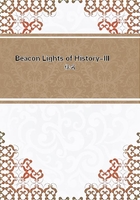
第157章
preaching and exhortation and instruction from the pulpit,--a forgotten power. He appeals to reason rather than sense; denounces superstitions, while he rebukes sins; and kindles a profound fervor, based on the recognition of new truths. He is not fully emancipated from the traditions of the past; for he retains the doctrine of transubstantiation, and keeps up the holidays of the Church, and allows recreation on the Sabbath. But what he thinks the most of is the circulation of the Scriptures among plain people. So he translates them into German. And this, not the first but the best translation, is done so well that it becomes the standard of the German language, as the Bible of Tindale helped to form the English tongue; and not only so, but it has remained the common version in use throughout Germany, even as the authorized King James version, made nearly a century later by the labor of many scholars and divines, has remained the standard English Bible.
Moreover, he finds time to make liturgies and creeds and hymns, and to write letters to all parts of Christendom,--a Jerome, a Chrysostom, and an Augustine united; a kind of Protestant pope, to whom everybody looks for advice and consolation. What a wonderful man! No wonder the Germans are so fond of him and so proud of him,--a Briareus with a hundred arms; a marvel, a wonder, a prodigy of nature; the most gifted, versatile, hard-working man of his century or nation!
At last, this great theologian, this daring innovator, is summoned by imperial, not papal, authority before the Diet of the empire at Worms, where the Emperor, the great Charles V., presides, amid bishops, princes, cardinals, legates, generals, and dignitaries.
Thither Luther must go,--yet under imperial safe conduct,--and consummate his protests, and perhaps offer up his life. Painters, poets, historians, have made that scene familiar,--the most memorable in the life of Luther, as well as one of the grandest spectacles of the age. I need not dwell on that exciting scene, where, in the presence of all that was illustrious and powerful in Germany, this defenceless doctor dares to say to supremest temporal and spiritual authority, "Unless you confute me by arguments drawn from Scripture, I cannot and will not recant anything . . . Here Istand; I cannot otherwise: God help me! Amen." How superior to Galileo and other scientific martyrs! He is not afraid of those who can kill only the body; he is afraid only of Him who hath power to cast both soul and body into hell. So he stands as firm as the eternal pillars of justice, and his cause is gained. What if he did not live long enough to accomplish all he designed! What if he made mistakes, and showed in his career many of the infirmities of human nature! What if he cared very little for pictures and statues,--the revived arts of Greece and Rome, the Pagan Renaissance in which he only sees infidelity, levities, and luxuries, and other abominations which excited his disgust and abhorrence when he visited Italy! HE seeks, not to amuse and adorn the Papal empire, but to reform it; as Paul before him sought to plant new sentiments and ideas in the Roman world, indifferent to the arts of Greece, and even the beauties of nature, in his absorbing desire to convert men to Christ. And who, since Paul, has rendered greater service to humanity than Luther? The whole race should be proud that such a man has lived.
We will not follow the great reformer to the decline of his years;we will not dwell on his subsequent struggles and dangers, his marvellous preservation, his personal habits, his friendships and his hatreds, his joys and sorrows, his bitter alienations, his vexatious, his disappointments, his gloomy anticipations of approaching strife, his sickened yet exultant soul, his last days of honor and of victory, his final illness, and his triumphant death in the town where he was born. It is his legacy that we are concerned in, the inheritance he left to succeeding generations,--the perpetuated ideas of the Reformation, which he worked out in anguish and in study, and which we will not let die, but will cherish in our memories and our hearts, as among the most precious of the heirlooms of genius, susceptible of boundless application.
And it is destined to grow brighter and richer, in spite of counter-reformation and Jesuitism, of Pagan levities and Pagan lies, of boastful science and Epicurean pleasures, of material glories, of dissensions and sects and parties, as the might and majesty of ages coursing round the world regenerates institutions and nations, and proclaims the sovereignty of intelligence, the glory and the power of God.
AUTHORITIES.
Ranke's Reformation in Germany; D'Aubigne's History of the Reformation; Luther's Letters; Mosheim's History of the Church;Melancthon's Life of Luther: Erasmi Epistolae; Encyclopaedia Britannica.
THOMAS CRANMER.
A. D. 1489-1556.
THE ENGLISH REFORMATION.
As the great interest of the Middle Ages, in an historical point of view, centres around the throne of the popes, so the most prominent subject of historical interest in our modern times is the revolt from their almost unlimited domination. The Protestant reformation, in its various relations, was a movement of transcendent importance. The history of Christendom, in a moral, a political, a religious, a literary, and a social point of view, for the last three hundred years, cannot be studied or comprehended without primary reference to that memorable revolution.
We have seen how that great insurrection of human intelligence was headed in Germany by Luther, and we shall shortly consider it in Switzerland and France under Calvin. We have now to contemplate the movement in England.